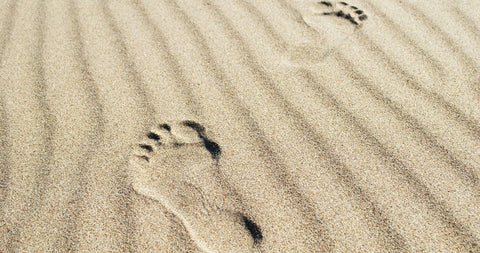
Looking After Your Feet During Menopause
A lot of things can change during menopause and perimenopause – and that includes the way our feet feel. It can sometimes be tricky to find information about menopausal symptoms or how to deal with them.
Things like burning feet, cracked heels or just sore achy feet can be caused by changes in hormones, weight and collagen levels, but that doesn’t mean there’s nothing you can do to help.
How menopause may affect your feet
You may notice a few changes to your feet during menopause and perimenopause and lots of people experience discomfort or annoying symptoms. So why might they be happening?
Lower collagen levels
Menopause affects our collagen supply and low collagen can cause general foot pain, as there’s less cushioning. This can also lead to bunions and corns, which can raise levels of discomfort too.
Weight gain
Changes in hormones mean that some women may gain weight during menopause. This can put extra pressure on your feet and contribute to pain or discomfort (source: NHS Inform).
Drier skin
Menopause affects the amount of moisture your skin retains too. Dry skin can contribute to cracked heels, which can become painful or infected.
Lower oestrogen levels
Oestrogen levels also tend to lower during perimenopause which can affect your musculoskeletal system, including the bottom of your feet, and be linked to plantar fasciitis (source: Harley Street at Home).
Oestrogen also affects how the brain regulates temperature and low levels may make your body more sensitive to temperature changes and lead to symptoms like hot feet (source: Bupa).
Ways to look after your feet
There are a few things you can to do help your feet feel better, here are a few of our favourites.
Switch to wide shoes with low heels
The more comfortable and accommodating the shoe, the less constricted your foot is. This can help ease bunions and reduce the pressure on dry or cracked skin.
Use a soft sole or insert
To combat the discomfort of loss of fat and collagen on the bottom of your feet, choose shoes with a comfortable sole or add one to your favourite shoes like our GelActiv™ Gel Insoles.
Eat collagen-boosting nutrients
Eating vitamin C, zinc and copper-rich foods can help replenish your supply of collagen, which could help alleviate your symptoms.
Keep your bedroom cool
Help alleviate the feeling of hot or burning feet by keeping your bedroom cool when you go to sleep. Managing your stress levels can also help to ease night sweats and hot flushes.
Avoid high-impact activities
Running or jumping can put more pressure on feet that are already sore, switch to lower-impact activities like swimming or walking and support your feet and consider an insole designed for sport.
Support your arches
If the weight gain caused by menopause is giving you sore and aching feet, avoid walking around barefoot. Using orthotics and insoles may also reduce discomfort by supporting your arches.
Keep your skin moisturised
Combat dry skin and help to ease cracked heels with hot warm baths and a powerful moisturiser, like our Expert Care Dry Skin Foot Cream.
Products:



